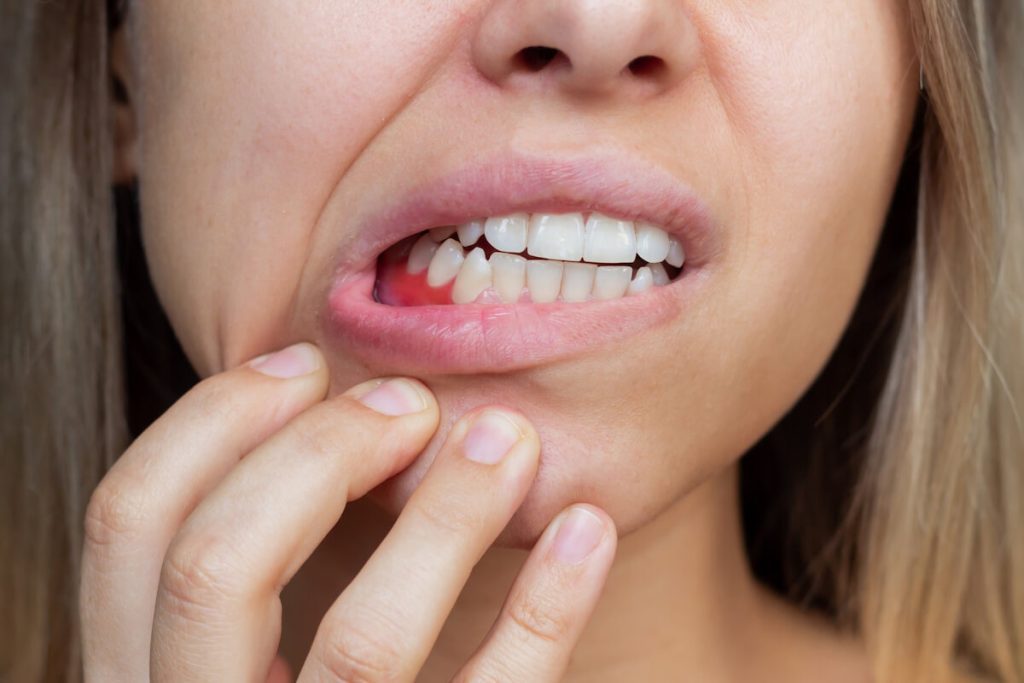8 Symptoms Of Gingivitis And How to Prevent Them

Untreated gum disease is one of the world’s most common health problems, harming people’s oral and overall health.
In the last few years, more research has discovered statistical links between gum disease and various chronic health problems, including diabetes, stroke, arthritis, dementia, cancer, and heart disease.
While researchers have not yet pinned down a directly causative relationship between gum disease and these diseases, the studies show that oral health is more than just an issue of how healthy our teeth and gums are.
The good news is that you can avoid developing early gum disease – often called gingivitis – by daily brushing and flossing and scheduling regular visits to Captivate Dental.
So that you have the tools to lower your risk of gum disease, it’s important to know what causes gingivitis and how to prevent the disease’s development.
With that in mind, here’s what you need to know about gingivitis – its symptoms, risk factors, how to avoid it, and treatment.
8 Gingivitis Symptoms and Signs
Here are 8 gingivitis symptoms to watch out for:
- Red or purple gums.
- Puffy gums.
- Bleeding gums, especially when you brush or floss.
- Receding gums.
- Sore gums that won’t go away.
- Tooth pain or sensitivity. As gums pull away from teeth, teeth become exposed and more sensitive to hot and cold foods or beverages.
- Bad breath that becomes persistent. Plaque is full of bacteria that produce nasty-smelling waste products.
- Loose teeth or changes in how your teeth fit when you bite down. If your teeth are at this point, you have likely gone past gingivitis to the much more destructive periodontitis.
What factors can increase my risk for gingivitis?
- Genetics
- Diabetes
- Poor Nutrition
- Smoking
- Substance Abuse
- Age
- Gender- woman are more likely to suffer from gingivitis due to their hormonal changes
- Certain medicines
Avoiding Gingivitis
- Brush thoroughly and regularly. Gingivitis starts with bacteria on your teeth from food residue. If untreated, gingivitis leads to more serious gum problems, including periodontitis. Left completely untreated, gingivitis can eventually lead to overall health issues. Practising a consistent brushing routine is the most effective way to fight gingivitis. Brush twice a day and after each meal if possible.
- Be sure to floss. Flossing is a key component of any dental healthcare regimen. Yet, flossing is also one of the most frequently skipped steps. If you’re not flossing food particles out from between your teeth, you’re probably not getting all the bacteria out of your mouth. Floss at least once a day before going to sleep. Try keeping your floss right next to your toothbrush as a regular reminder of this important habit.
- Quit smoking and avoid substance abuse. People who use tobacco products (of any kind) are more prone to getting gum disease — in fact, they’re twice as likely to contract the illness as nonsmokers. It is also more difficult to treat gum disease in smokers due to their weakened immune systems. Overuse of alcohol can have the same effect, and recreational drugs such as methamphetamines can also damage the gums.
- Take vitamins. Those with higher levels of vitamin D are 20 per cent less likely to suffer from gingivitis. Vitamin C can help with bleeding gums. Calcium strengthens your jawbone. Generally, vitamins and a good diet can help maintain oral health.
- Visit Captivate Dental twice a year. Captivate Dental will check for early signs of gum disease and offer appropriate preventative measures. We may evaluate the colour and firmness of your gums and measure the space between your teeth and gums.
Treatment of Gingivitis
If you already show signs of gingivitis, it’s important to seek professional dental care to treat the condition effectively.
Here are some common treatment options:
- Professional Dental Cleaning. Your Cheltenham dentist will thoroughly clean your teeth and gums, removing all traces of plaque, tartar, and bacteria. This process, known as scaling, is essential to prevent the progression of gum disease.
- Improved Oral Hygiene Practices. Following the cleaning, your dentist will provide specific instructions on maintaining oral hygiene at home, including proper brushing and flossing techniques.
- Medicated Mouthwash. Your Cheltenham dentist may prescribe a medicated mouthwash to help reduce bacteria and control inflammation in your gums.
- Dental Procedures. In more severe cases, procedures such as root planing (deep cleaning) may be necessary to clean the roots of your teeth and prevent further gum damage.
- Regular Follow-Up Visits. Frequent dental check-ups and cleanings are crucial to monitor your progress and ensure that gingivitis is under control.
Professional Dental Care for Gingivitis in Cheltenham
At Captivate Dental, we can help you with scaling, which removes plaque and tartar.
This is known as scaling. Scaling can be uncomfortable, especially if there is substantial tartar build-up, so it is better to fight gingivitis at home!
We will also give you oral hygiene instructions and an update on brushing and flossing properly.
We may recommend follow-up appointments and schedule more regular cleanings if necessary. If any teeth are damaged or crooked, we can treat them to remove the environment that bacteria and tartar like to live in.
We will also take a look at your dental appliances, as poorly fitted bridges or crowns can make it more difficult to remove plaque and tartar.
The Captivate Dental Advantage
Captivate Dental can’t be beaten when it comes to providing you and your family with quality dental care in a friendly and warm environment.
From routine dental procedures like check-ups to complicated dental needs like implants and root canals, the Cheltenham dental team has you covered!
Call (03) 9553 1249 or visit us at 36 Chesterville Road in Cheltenham.

